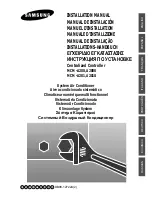
10
18-AC126D1-1A-EN
Table 11.
Reuse Existing Refrigerant Lines
C
CA
AU
UT
TIIO
ON
N
R
RE
EF
FR
RIIG
GE
ER
RA
AN
NT
T!!
F
Fa
aiillu
urre
e tto
o iin
nssp
pe
ecctt o
orr u
usse
e p
prro
op
pe
err sse
errv
viicce
e tto
oo
ollss m
ma
ay
y
rre
essu
ulltt iin
n e
eq
qu
uiip
pm
me
en
ntt d
da
am
ma
ag
ge
e o
orr p
pe
errsso
on
na
all iin
njju
urry
y..
IIff u
ussiin
ng
g e
ex
xiissttiin
ng
g rre
effrriig
ge
erra
an
ntt lliin
ne
ess m
ma
akke
e cce
errtta
aiin
n tth
ha
att
a
allll jjo
oiin
nttss a
arre
e b
brra
azze
ed
d,, n
no
ott sso
olld
de
erre
ed
d..
For retrofit applications, where the existing indoor evaporator coil
and/or refrigerant lines will be used, the following precautions
should be taken.
•
Ensure that the indoor evaporator coil and refrigerant lines are
the correct size.
•
Ensure that the refrigerant lines are free of leaks, acid, and oil.
Important:
For more information, see publication number SS-
APG006–EN
Table 12.
Refrigerant Line Routing Precautions
Important:
Comply with National, State, and Local Codes when isolating line sets from joists, rafters, walls, or other structural elements.
Important:
Take precautions to prevent noise within the building structure due to vibration transmission from the refrigerant lines.
For Example:
•
When the refrigerant lines must be fastened to floor joists or other framing in a structure, use isolation type hangers.
•
Isolation hangers should also be used when refrigerant lines are run in stud spaces or enclosed ceilings.
•
Where the refrigerant lines run through a wall or sill, they should be insulated and isolated.
•
Isolate the lines from all duct work.
•
Minimize the number of 90° turns.
Table 13.
Isolation From Joist/Rafter
8 Feet Maximum
Side View
8 Feet Maximum
Joist/Rafter
Isolator
Line Set
Secure Vapor Line from joists using isolators every 8 ft. Secure Liquid Line directly to insulated Vapor Line using tape, wire, or other appropriate
method every 8 ft.











































